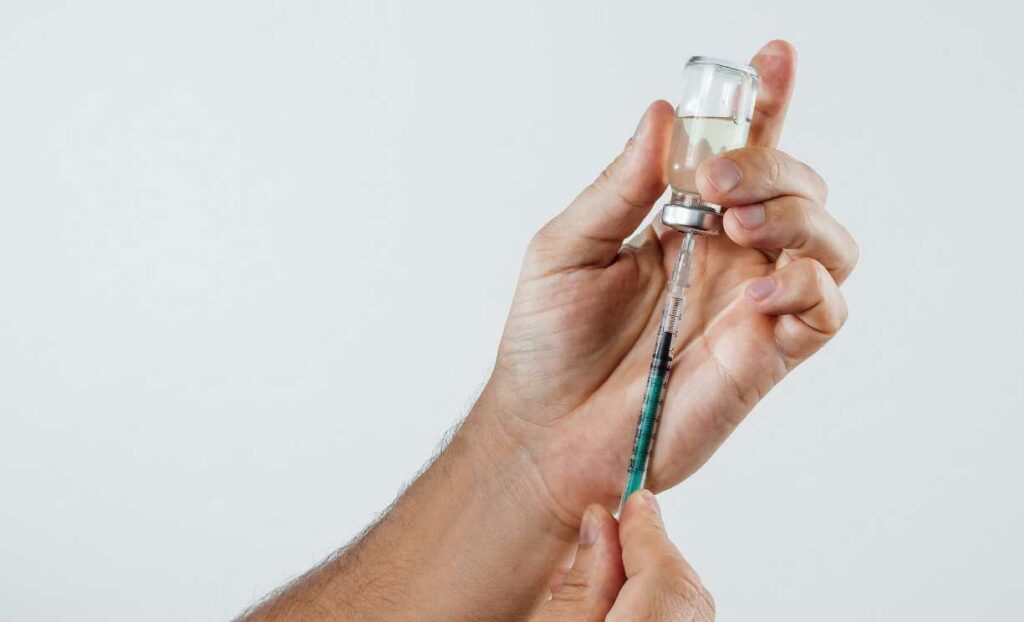Polycystic Ovary Syndrome (PCOS) is a common hormonal disorder affecting many women, often posing challenges to fertility. For those grappling with PCOS-related infertility, ovulation induction can be a promising solution. Ovulation induction involves the use of medications, commonly injectables, to stimulate the ovaries and enhance the chances of successful ovulation. In this blog, we’ll delve into the intricacies of ovulation injections for PCOS, exploring how they work, their potential benefits, and what individuals considering this treatment can expect on their fertility journey.
Contents
How Does PCOS Affect Ovulation?
Polycystic Ovary Syndrome (PCOS) can affect ovulation in a few ways. In simple terms, women with PCOS often experience hormonal imbalances that disrupt the normal menstrual cycle. Normally, the ovaries release an egg each month during ovulation, but in PCOS, this process can become irregular or absent. The hormonal imbalance can lead to the overproduction of androgens (male hormones) and insulin resistance, influencing the ovaries’ ability to release eggs consistently. As a result, women with PCOS may have infrequent ovulation or not ovulate at all, affecting their fertility. The small fluid-filled sacs (cysts) that form on the ovaries further contribute to this hormonal imbalance. The disrupted ovulation can lead to irregular periods and challenges in conceiving for women with PCOS.
How Ovulation Injections Work?
The Benefits Of Ovulation Injections For PCOS
The benefits of ovulation injections for individuals with Polycystic Ovary Syndrome (PCOS) are significant, addressing specific challenges associated with fertility in those with this hormonal disorder. Here are the key advantages:
- Improved Ovulation Success: Ovulation injections, typically containing hormones like FSH, enhance the chances of successful ovulation. This is particularly crucial for individuals with PCOS, where irregular ovulation is a common obstacle to conception.
- Controlled Ovarian Stimulation: Ovulation injections provide fertility specialists with precise control over the stimulation of the ovaries. This control helps minimize the risk of complications associated with multiple pregnancies, a concern often associated with fertility treatments.
- Real-Time Monitoring and Adjustments: The ovulation induction process involving injections is closely monitored through ultrasounds and hormone level assessments. This real-time monitoring allows for adjustments to the treatment plan, ensuring safety and optimizing the chances of successful conception.
- Personalized Treatment Approach: Ovulation injections are part of a personalized treatment plan designed to meet the individual needs of patients with PCOS. Dosages and durations can be adjusted based on the patient’s response, tailoring the treatment for optimal effectiveness.
Ovulation Medicines For PCOS
Polycystic Ovary Syndrome (PCOS) often leads to irregular ovulation, making it challenging for women with this condition to conceive. Fortunately, various ovulation-inducing medications can help regulate the menstrual cycle and enhance the chances of successful ovulation. Here are some common ovulation medicines:
- Clomiphene Citrate (Clomid): Clomid is a commonly prescribed oral medication that stimulates the ovaries to produce eggs. It works by blocking estrogen receptors in the brain, prompting the body to produce more follicle-stimulating hormone (FSH) and luteinizing hormone (LH). This increased hormonal activity encourages ovulation.
- Letrozole (Femara): Letrozole is another oral medication that is sometimes used for ovulation induction in women with PCOS. It works by inhibiting the production of estrogen, leading to increased FSH and LH levels and, subsequently, improved ovulatory function.
- Metformin: While primarily known as an insulin-sensitizing medication used to manage diabetes, Metformin is also prescribed for women with PCOS. It helps regulate insulin levels, which, in turn, may improve ovarian function and promote regular ovulation.
- Gonadotropins (Injectable Hormones): Gonadotropins, including FSH and LH, are injectable hormones that directly stimulate the ovaries. These injections often help with oral medications like Clomid or Letrozole are ineffective. Gonadotropins require careful monitoring due to the increased risk of multiple pregnancies.
- Human Chorionic Gonadotropin (hCG): In some cases, hCG may be prescribed to trigger ovulation. This hormone mimics the LH surge, prompting the release of mature eggs from the ovaries.
It’s important to note that the choice of medication depends on individual factors such as medical history, response to previous treatments, and the severity of PCOS symptoms. Fertility specialists carefully tailor treatment plans to meet the specific needs of each patient.
Other Treatment Options For Ovulation With PCOS
In addition to medications that induce ovulation, there are various treatment options for managing ovulatory issues associated with Polycystic Ovary Syndrome (PCOS). These approaches aim to regulate menstrual cycles and improve fertility. Here are some alternative and complementary options:
- Nutritional Support:
- Balanced Diet: Adopting a balanced and nutritious diet is crucial for women with PCOS. A diet rich in whole grains, fruits, vegetables, and lean proteins can contribute to hormonal balance and overall reproductive health.
- Supplements: Some women with PCOS may benefit from certain supplements such as inositol, which has shown promise in improving ovulatory function.
- Ovulation Monitoring:
- Basal Body Temperature (BBT) Charting: Tracking basal body temperature can help identify the timing of ovulation. A rise in temperature typically indicates that ovulation has occurred.
- Ovulation Predictor Kits (OPKs): These kits detect the surge in luteinizing hormone (LH) that precedes ovulation, providing an indication of the fertile window.
- Acupuncture: Acupuncture involves the insertion of thin needles into specific points on the body. Some studies suggest that acupuncture may help regulate menstrual cycles and improve ovulation in women with PCOS.
- Herbal Remedies: Certain herbs, such as vitex (chaste berry) and spearmint, are believed to have potential benefits for hormonal balance and ovulation. However, the use of herbal remedies should be under the guidance of a healthcare professional.
- Mind-Body Practices: Stress management techniques, including yoga, meditation, and deep breathing exercises, can be beneficial. Chronic stress can contribute to hormonal imbalances, affecting ovulation.
- Assisted Reproductive Technologies (ART): In more complex cases, assisted reproductive technologies such as in vitro fertilization (IVF) may be considered. IVF involves fertilizing an egg with sperm outside the body and implanting the embryo into the uterus.
Lifestyle Modifications For Ovulation With PCOS
Lifestyle modifications play a crucial role in managing ovulatory issues associated with PCOS. These changes aim to improve overall health, regulate hormonal balance, and enhance fertility. Here are key lifestyle modifications for women with PCOS focusing on improving ovulation:
- Maintain a Healthy Weight: Maintaining a healthy weight is one of the most impactful lifestyle changes for managing PCOS. Weight loss, even as modest as 5-10%, can significantly improve ovulation and hormonal balance.
- Regular Exercise: Engage in regular physical activity to improve insulin sensitivity and promote overall health. Both aerobic exercises, such as brisk walking or jogging, and strength training can be beneficial. Aim for at least 150 minutes of moderate-intensity exercise per week.
- Stress Management: Chronic stress can exacerbate hormonal imbalances. Practice stress-reducing techniques such as yoga, meditation, deep breathing exercises, or mindfulness. Adequate sleep is also essential for stress management and overall well-being.
- Hydration: Stay well-hydrated by drinking plenty of water throughout the day. Proper hydration supports overall health and can contribute to hormonal balance.
- Limit Caffeine and Alcohol Intake: Consider reducing caffeine intake, as excessive caffeine consumption may affect hormonal balance. Similarly, limit alcohol consumption, as it can impact liver function and hormone metabolism.
- Quit Smoking: Smoking can exacerbate the symptoms of PCOS and is associated with various health risks. Quitting smoking can contribute to overall health improvement.
- Regular Check-ups and Health Screenings: Schedule regular check-ups with healthcare providers to monitor overall health. This includes routine screenings for diabetes, cholesterol levels, and blood pressure.
- Supplements: Some women with PCOS may benefit from specific supplements. Consult with a doctor before taking any supplements, options may include inositol, omega-3 fatty acids, and vitamin D.
- Fertility Awareness: Track menstrual cycles, and basal body temperature, and use ovulation predictor kits to identify fertile windows. This can help maximize the chances of conception.
Conclusion
In conclusion, the journey of overcoming ovulatory challenges associated with Polycystic Ovary Syndrome (PCOS) often involves a multi-faceted approach, with ovulation injections emerging as a key player in fertility interventions. These injections, containing hormones like FSH, provide a targeted and effective method for stimulating ovulation in women with PCOS, addressing a common hurdle on the path to conception. The benefits of increased ovulatory success, controlled ovarian stimulation, and personalized treatment plans underscore the significance of ovulation injections in reproductive medicine.
However, it’s crucial to recognize that ovulation injections are just one aspect of a comprehensive strategy. Lifestyle modifications, nutritional support, and alternative therapies can complement medical interventions, contributing to an improved reproductive landscape for women with PCOS.





